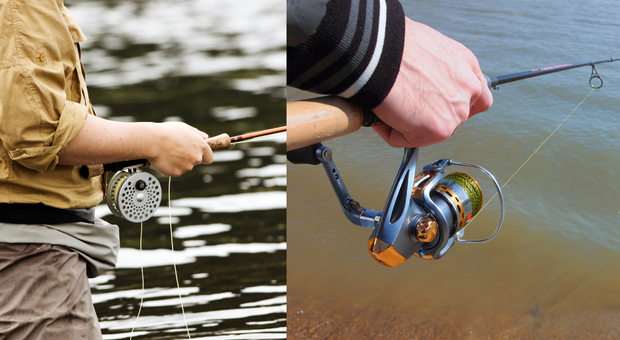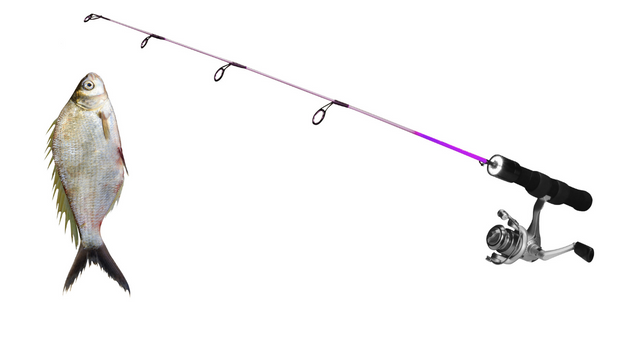Are you ready to cast your line and dive into the heated debate of fly fishing vs. regular fishing? Well, buckle up cause we’re about to reel in the truth!
It’s a common misconception that fly fishing is a walk in the park. But let me tell you; it’s far from it! The art of fly fishing is a true test of patience, precision, and perseverance.
On the other hand, regular fishing is a much more straightforward affair.
But is it really easier? Let’s find out,
Is fly fishing harder than regular fishing?
Yes – Fly fishing is harder than traditional fishing due to the technical skills required, such as casting with a flexible rod and manipulating the line to imitate the movement of a fly. Apart from that, the level of difficulty can vary depending on personal experience and skill.
Table of Contents
Fly fishing vs Regular fishing: What’s better?

It’s very subjective! First of all, you need to know what the purpose of fishing for you is.
Do you want to catch fish and eat them, or do you just want to explore the outdoors and enjoyment?
Here is the ANSWER.
If your is the first option, that means you catch the fish for dinner, or any other reason than regular fishing is for you. The main reason is Spin fishing much easier than fly fishing; you don’t need to know any technical things.
On the other hand, Fly fishing is more sophisticated and needs to understand precise casting techniques. Fly fishermen never keep the fish; they just enjoy fishing.
So, if your purpose is to do that, then Fly fishing is an absolute pleasure.
Pros and Cons of Fly Fishing
Fly fishing is an elegant and graceful sport, offering a unique and tranquil experience for anglers. But, like all things in life, it’s not without its challenges.
Pros:
- Connection with Nature – Casting a line with a delicate fly, surrounded by the serene sounds of rushing water and chirping birds, creates a harmonious bond with the natural world.
- Mental and Physical Exercise – Timing, technique, and strategy all come into play, keeping the mind and body active and engaged.
- Opportunities for Adventure – From remote mountain streams to rolling rivers, fly fishing allows you to explore and discover new landscapes and aquatic species.
- Zen-like Focus – The repetitive motion of casting, combined with the peaceful surroundings, fosters a meditative state where worries and stress drift away.
- Sense of Accomplishment – When a fish takes the Fly, and the angler sets the hook, the thrill of the fight and eventual release is a satisfying and humbling victory.
Cons:
- Costly Equipment – Fly fishing gear can be expensive, requiring specialized rods, reels, lines, and flies.
- Learning Curve – Becoming proficient at fly fishing requires patience, practice, and dedication.
- Environmental Impact – Fishing, in general, can have negative effects on delicate ecosystems. Fly fishing, with its use of artificial flies, requires extra care to minimize harm.
Fly fishing offers a unique and rewarding experience for those willing to invest time and effort. The zen-like focus, opportunities for adventure, and sense of accomplishment are well worth the challenges.
Difference between fly fishing and regular fishing rods
Fly fishing uses a long, skinny rod with a light line and a fake bug, called a fly, attached to the end.

The angler has to cast the line in a specific way to make it look like the Fly is flying through the water, hence the name fly fishing.
It’s all about finesse and tricking the fish into biting.
Also Read: What’s The Difference Between Fly Fishing And Regular Fishing?
On the other hand, spin fishing uses a short, sturdy rod with a heavy line and a lure that spins through the water.

FAQs
Is fly fishing for the rich?
Is fly fishing more fun than spin fishing?
Is fly fishing expensive?
What is the success rate of fly fishing?
The success rate of fly fishing is between 85-95%. It can vary based on many factors, such as the angler’s experience, the type of water, the type of fish being targeted, and the conditions.Experienced fly fishermen often have a higher success rate compared to beginners, but even they can have slow days on the water.
If you want to know more, then I would highly recommend you to read a pdf created by Sudesh Pursad. He analyzes Fly Fishing success rates from his own experiences.Read More: Trout Fishing In The Rain & Does Fly Fishing Hurt Fish?
Conclusion
The question of whether fly fishing is harder than regular fishing is YES. Fly fishing offers unique challenges and rewards, much like the fluid dance of a river and the grace of a soaring eagle.
The gentle tug on the line, the bend of the rod, and the shimmer of the lure all play a symphony in the angler’s heart as they wait for the thrill of a catch.
Both require patience, practice, and respect for the wild, but in the end, it’s the angler’s connection with nature that truly casts the deciding line.
